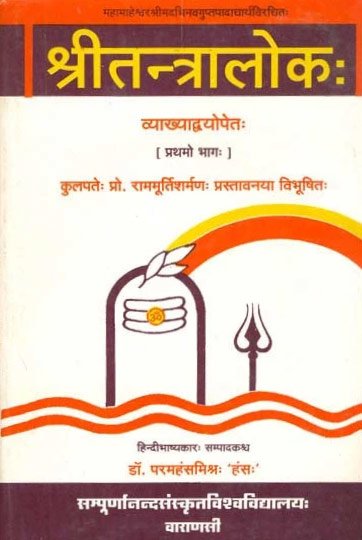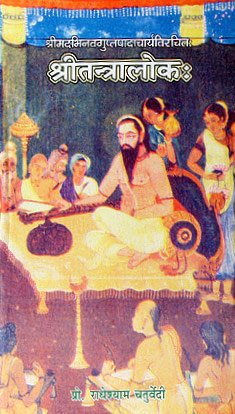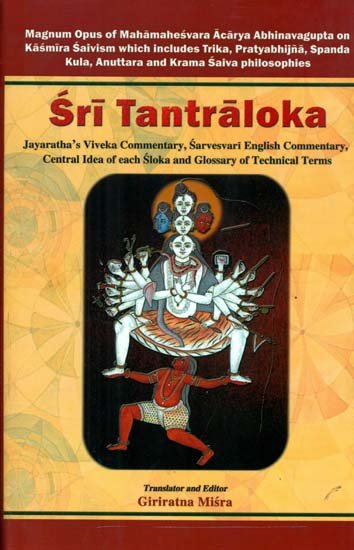Tantraloka [sanskrit text]
by Jun Takashima | 2020 | 46,255 words
The Sanskrit text of the Tantraloka of Abhinavagupta including grammatical analysis, English glossary and comparative print editions. The Tantraloka (“light on Tantra”) was written by Abhinavagupta in the 10th century in Kashmir and represents a major Encyclopedic work in Shaivism dealing with many core aspects and terminology.
Verse 28.309
श्रीरत्नमालाशास्त्रे तदुवाच परमेश्वरः ।
स्वशास्त्रे चाप्यहीशानो विश्वाधारधुरन्धरः ॥ ३०९ ॥
śrīratnamālāśāstre taduvāca parameśvaraḥ |
svaśāstre cāpyahīśāno viśvādhāradhurandharaḥ || 309 ||
The English translation of Tantraloka Verse 28.309 is contained in the book Sri Tantraloka by Satya Prakash Singh & Swami Maheshvarananda. This book is not available online so in order to read the full text and translation you should buy the book:
Buy now! English translation by Satya Prakash Singh & Swami Maheshvarananda (2015)
Glossary of Sanskrit terms
Note: This extracts Sanskrit terms and links to English definitions from the glossary, based on an experimental segmentation of verse (28.309). Some terms could be superfluous while some might not be mentioned. Click on the word to show English definitions.
Shriratnamala, Ashastra, Tad, Tat, Parameshvara, Svashastra, Capin, Capya, Capi, Ahi, Ishana, Vishvadhara, Dhurandhara,
Analysis of Sanskrit grammar
Note: this is an experimental feature and only shows the first possible analysis of the Sanskrit text (Tantraloka Verse 28.309). If the system was successful in segmenting the sentence, you will see of which words it is made up of, generally consisting of Nouns, Pronouns, Verbs, Participles and Indeclinables. Click on the link to show all possible derivations of the word.
- Line 1: “śrīratnamālāśāstre taduvāca parameśvaraḥ ”
- śrīratnamālā -
-
śrīratnamāla (noun, masculine)[compound], [vocative single]śrīratnamāla (noun, neuter)[compound], [vocative single]
- aśāstre -
-
aśāstra (noun, masculine)[locative single]aśāstra (noun, neuter)[nominative dual], [vocative dual], [accusative dual], [locative single]aśāstrā (noun, feminine)[nominative dual], [vocative single], [vocative dual], [accusative dual]
- tad -
-
tad (indeclinable)[indeclinable]tad (indeclinable adverb)[indeclinable adverb]tat (indeclinable correlative)[indeclinable correlative]tad (noun, neuter)[compound], [nominative single], [accusative single]
- uvāca -
-
√vac (verb class 2)[perfect active first single], [perfect active third single]√vac (verb class 3)[perfect active first single], [perfect active third single]
- parameśvaraḥ -
-
parameśvara (noun, masculine)[nominative single]
- Line 2: “svaśāstre cāpyahīśāno viśvādhāradhurandharaḥ ”
- svaśāstre -
-
svaśāstra (noun, masculine)[locative single]svaśāstra (noun, neuter)[nominative dual], [vocative dual], [accusative dual], [locative single]
- cāpya -
-
cāpin (noun, masculine)[compound], [adverb], [nominative single]cāpin (noun, neuter)[compound], [adverb], [nominative single], [vocative single], [accusative single]√ci -> cāpya (participle, masculine)[compound from √ci]√ci -> cāpya (participle, neuter)[compound from √ci]√ci -> cāpya (absolutive)[absolutive from √ci]cāpī (noun, masculine)[compound], [adverb]cāpī (noun, feminine)[compound], [adverb], [nominative single], [vocative single]cāpī (noun, neuter)[compound], [adverb], [nominative single], [vocative single], [accusative single]cāpi (noun, masculine)[compound], [adverb], [nominative dual], [vocative dual], [accusative dual]cāpi (noun, feminine)[compound], [adverb], [nominative dual], [vocative dual], [accusative dual]cāpi (noun, neuter)[compound], [adverb], [nominative single], [vocative single], [accusative single]√ci -> cāpya (participle, masculine)[vocative single from √ci]√ci -> cāpya (participle, neuter)[vocative single from √ci]
- ahī -
-
ahi (noun, masculine)[compound], [adverb], [nominative dual], [vocative dual], [accusative dual]ahī (noun, feminine)[compound], [adverb], [nominative single], [vocative single]ahī (noun, masculine)[compound], [adverb], [vocative single]
- īśāno* -
-
īśāna (noun, masculine)[nominative single]√īś -> īśāna (participle, masculine)[nominative single from √īś class 2 verb]
- viśvādhāra -
-
viśvādhāra (noun, masculine)[compound], [vocative single]
- dhurandharaḥ -
-
dhurandhara (noun, masculine)[nominative single]
Other editions:
Also see the following editions of the Sanskrit text or (alternative) English translations of the Tantraloka Verse 28.309
Sri Tantraloka (Set of 8 Volumes)
by Paramahansa Mishra (2000)
[श्री तन्त्रालोकः (संस्कृत एवं हिंदी अनुवाद)] Sanskrit Text with Hindi Translation; Published by Sampurnanand Sanskrit University; With two commentaries: Viveka (विवेक) by Ācārya Śrī Jayaratha and Nīrakṣīraviveka (नीरक्षीरविवेक) by Paramhans Mishra.
Buy now!
Tantraloka of Abhinavagupta (with Jnanavati Hindi commentary)
by Radheshyam Chaturvedi (2002)
[आचार्य अभिनवगुप्त द्वारा रचित तंत्रलोक: संस्कृत एवम् हिन्दी अनुवाद (पाँच खंडों में)] Sanskrit Text with Hindi Translation and Commentary; Published by Chaukhambha Vidya Bhawan.
Buy now!
Sri Tantraloka of Abhinavagupta
by Giriratna Misra (2018)
With Viveka Saṃskṛta Commentary by Rājānaka Jayaratha; Sanskrit Text, Transliteration, Sarveshwari English commentary; With Glossary and Central Idea of Each Śloka; Published by Chaukhamba Surbharati Prakashan
Buy now!![Tantraloka [sanskrit text] - book cover](/uploads/a/Tantraloka-Sanskrit.jpg)


